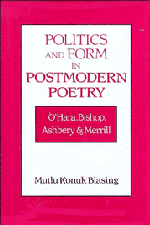Book contents
- Frontmatter
- Contents
- Acknowledgments
- Introduction: Poetry after Modernism
- Frank O'Hara: “How Am I to Become a Legend?”
- Elizabeth Bishop: “Repeat, Repeat, Repeat; Revise, Revise, Revise”
- John Ashbery: “The Epidemic of the Way We Live Now”
- James Merrill: “Sour Windfalls of the Orchard Back of Us”
- Notes
- Works Cited
- Index
- CAMBRIDGE STUDIES IN AMERICAN LITERATURE AND CULTURE
Introduction: Poetry after Modernism
Published online by Cambridge University Press: 12 March 2010
- Frontmatter
- Contents
- Acknowledgments
- Introduction: Poetry after Modernism
- Frank O'Hara: “How Am I to Become a Legend?”
- Elizabeth Bishop: “Repeat, Repeat, Repeat; Revise, Revise, Revise”
- John Ashbery: “The Epidemic of the Way We Live Now”
- James Merrill: “Sour Windfalls of the Orchard Back of Us”
- Notes
- Works Cited
- Index
- CAMBRIDGE STUDIES IN AMERICAN LITERATURE AND CULTURE
Summary
The history of twentieth-century poetry has been read largely with a bias for the aesthetic values that gained currency with modernism. Privileging technical experimentation and novelty has precluded approaching post–World War II poetry in ways that take into account the different rhetorical and formal options available to poets after the early decades of the twentieth century. I want to begin by addressing this pervasive bias, its historical background, and its values as they have shaped discussions of postwar American poetry.
The consensus is that the history of American poetry since World War II represents a contest between a formalist academic consolidation of early modernism's experimental impulse and an antiformalist revolt that reaffirms presence and process in open forms. This heroic drama of a central agon between the forces of reaction and progress –with its farcical repetition in the current competition between the New Formalists and the Language poets –assumes that postwar experimental poetry is continuous with modernist experimentalism; that the technical continuity of open forms bespeaks a continuity of moral, metaphysical, and political agendas; and that early modernist and postmodern poetry alike pose avant-garde oppositional challenges to the cultural establishment. In one way or another, experimental techniques are taken to be the most significant marker of twentieth-century poetry, with the attendant implication that modernism's technical break with nineteenth-century poetry was, in fact, a substantive break as well and ushered in a new aesthetic informing poetry to this day, despite some setbacks.
- Type
- Chapter
- Information
- Politics and Form in Postmodern PoetryO'Hara, Bishop, Ashbery, and Merrill, pp. 1 - 29Publisher: Cambridge University PressPrint publication year: 1995



